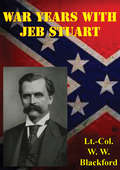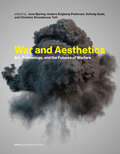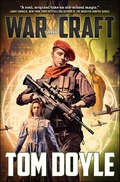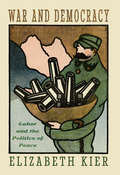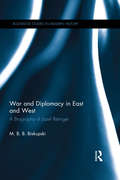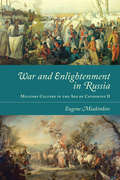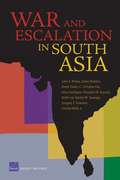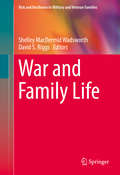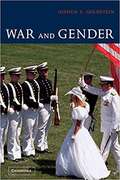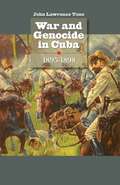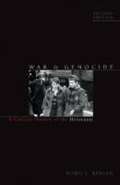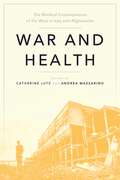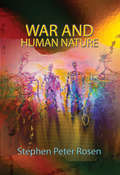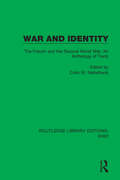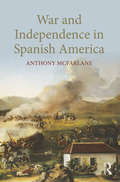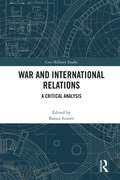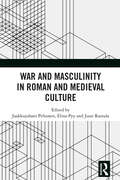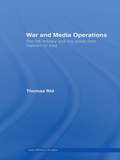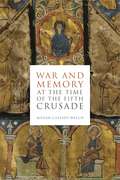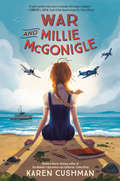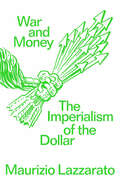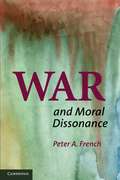- Table View
- List View
War Years With Jeb Stuart
by Lieutenant Colonel W. W. Blackford C.S.A."Characterized by precision of statement and clarity of detail, W.W. Blackford's memoir of his service in the Civil War is one of the most valuable to come out of Robert E. Lee's Army of Northern Virginia. It also provides a critically important perspective on one of the best-known Confederate cavalrymen, Major General J.E.B. Stuart.Blackford was thirty years old when the war began, and he served from June 1861, until January, 1864, as Stuart's adjutant, developing a close relationship with Lee's cavalry commander. He subsequently was a chief engineer and a member of the staff at the cavalry headquarters. Because Stuart was mortally wounded in 1864, he did not leave a personal account of his career. Blackford's memoir, therefore, is a vital supplement to Stuart's wartime correspondence and reports.In a vivid style, Blackford describes the life among the cavalrymen, including scenes of everyday camp life and portraits of fellow soldiers both famous and obscure. He presents firsthand accounts of, among others, the battles of First Bull Run, the Peninsular campaign, Second Bull Run, Antietam, Fredericksburg, Gettysburg, the Wilderness, and Cold Harbor, and describes his feelings at witnessing the surrender at Appomattox."-Print ed.
War and Aesthetics: Art, Technology, and the Futures of Warfare (Prisms: Humanities and War #1)
by Jens Bjering, Anders Engberg-Pedersen, Solveig Gade, and Christine Strandmose ToftA provocative edited collection that takes an original approach toward the black box of military technology, surveillance, and AI—and reveals the aesthetic dimension of warfare.War and Aesthetics gathers leading artists, political scientists, and scholars to outline the aesthetic dimension of warfare and offer a novel perspective on its contemporary character and the construction of its potential futures. Edited by a team of four scholars, Jens Bjering, Anders Engberg-Pedersen, Solveig Gade, and Christine Strandmose Toft, this timely volume examines warfare through the lens of aesthetics, arguing that the aesthetic configurations of perception, technology, and time are central to the artistic engagement with warfare, just as they are key to military AI, weaponry, and satellite surveillance.People mostly think of war as the violent manifestation of a political rationality. But when war is viewed through the lens of aesthesis—meaning perception and sensibility—military technology becomes an applied science of sensory cognition. An outgrowth of three war seminars that took place in Copenhagen between 2018 and 2021, War and Aesthetics engages in three main areas of inquiry—the rethinking of aesthetics in the field of art and in the military sphere; the exploration of techno-aesthetics and the wider political and theoretical implications of war technology; and finally, the analysis of future temporalities that these technologies produce. The editors gather various traditions and perspectives ranging from literature to media studies to international relations, creating a unique historical and scientific approach that broadly traces the entanglement of war and aesthetics across the arts, social sciences, and humanities from ancient times to the present. As international conflict looms between superpowers, War and Aesthetics presents new and illuminating ways to think about future conflict in a world where violence is only ever a few steps away.ContributorsLouise Amoore, Ryan Bishop, Jens Bjering, James Der Derian, Anthony Downey, Anders Engberg-Pedersen, Solveig Gade, Mark B. Hansen, Caroline Holmqvist, Vivienne Jabri, Caren Kaplan, Phil Klay, Kate McLoughlin, Elaine Scarry, Christine Strandmose Toft, Joseph Vogl, Arkadi Zaides
War and American Foreign Policy: Justifications of Major Military Actions in the US
by David J. LorenzoThis book explores presidential justifications of every major American military conflict from the War of 1812 to the Second Gulf War. It generates two important findings. First, presidents employ a specific standard (the Necessity Standard) publicly to justify decisions to go to war, and privately to make decisions regarding war and peace. The Necessity Standard holds that major military force should be used if no viable alternatives are available to protect vital interests or discharge duties. Second, when addressing the Necessity Standard, presidents have disclosed military and security policies that vary considerably in their patience with alternatives and their definitions of vital interests and duties. The book concludes by characterizing wars, categorizing presidential policies, and outlining how the central position of the Necessity Standard in the American politics of war and peace might affect policymaking processes, conflict management, and the public’s perceptions of wars and foreign policy.
War and Craft: A Novel (American Craft Series #3)
by Tom DoyleAmerica, land of the Free…and home of the warlocks.The Founding Fathers were never ones to pass up a good weapon. America’s first line of defense has been shrouded in secrecy, magical families who have sworn to use their power to protect our republic.But there are those who reject America’s dream and have chosen the Left Hand Path. In this triumphant conclusion to Tom Doyle’s imaginative alternate historical America, we start with a bloody wedding-night brawl with assassins in Tokyo. Our American magical shock troops go to India, where a descendant of legendary heroes has the occult mission they’ve been waiting for.It all comes to a head in a valley hidden high in the mountains of Kashmir. Our craftspeople will battle against their fellow countrymen, some of the vilest monsters of the Left Hand Path. It’s Armageddon in Shangri-La, and the end of the world as we know it.The American Craft Trilogy#1 American Craftsmen#2 The Left-Hand Way#3 War and CraftAt the Publisher's request, this title is being sold without Digital Rights Management Software (DRM) applied.
War and Cultural Heritage
by Marie Louise Stig Sørensen Dacia Viejo-RoseThe reconstruction of society after conflict is complex and multifaceted. This book investigates this theme as it relates to cultural heritage through a number of case studies relating to European wars since 1864. The case studies show in detail how buildings, landscapes, and monuments become important agents in postconflict reconstruction, as well as how their meanings change and how they become sites of competition over historical narratives and claims. Looking at iconic and lesser-known sites, this book connects broad theoretical discussions of reconstruction and memorialization to specific physical places, and in the process it traces shifts in their meanings over time. This book identifies common threads and investigates their wider implications. It explores the relationship between cultural heritage and international conflict, paying close attention to the long aftermaths of acts of destruction and reconstruction and making important contributions through the use of new empirical evidence and critical theory.
War and Democracy: Labor and the Politics of Peace
by Elizabeth KierChallenging the conventional wisdom that mass mobilization warfare fosters democratic reform and expands economic, social, and political rights, War and Democracy reexamines the effects of war on domestic politics by focusing on how wartime states either negotiate with or coerce organized labor, policies that profoundly affect labor's beliefs and aspirations. Because labor unions frequently play a central role in advancing democracy and narrowing inequalities, their wartime interactions with the state can have significant consequences for postwar politics.Comparing Britain and Italy during and after World War I, Elizabeth Kier examines the different strategies each government used to mobilize labor for war and finds that total war did little to promote political, civil, or social rights in either country. Italian unions anticipated greater worker management and a "land to the peasants" program as a result of their wartime service; British labor believed its wartime sacrifices would be repaid with "homes for heroes" and the extension of social rights. But Italy's unjust and coercive policies radicalized Italian workers (prompting a fascist backlash) and Britain's just and conciliatory policies paradoxically undermined broader democratization in Britain. In critiquing the mainstream view that total war advances democracy, War and Democracy reveals how politics during war transforms societal actors who become crucial to postwar political settlements and the prospects for democratic reform.
War and Diplomacy in East and West: A Biography of Józef Retinger (Routledge Studies in Modern History)
by M. B. BiskupskiThe New York Times said of Józef Hieronim Retinger that he was on intimate terms with most leading statesmen of the Western World, including presidents of the United States. He has been repeatedly acknowledged as one of the principle architects of the movement for European unity after the World War II, and one of the outstanding creative political influences of the post war period. He has also been credited with being the dark master behind the so-called "Bilderberg Group," described variously as an organization of idealistic internationalists, and a malevolent global conspiracy. Before that, Retinger involved himself in intelligence activities during World War II and, given the covert and semi-covert nature of many of his activities, it is little wonder that no biography has appeared about him. This book draws on a broad range of international archives to rectify that.
War and Enlightenment in Russia: Military Culture in the Age of Catherine II
by Eugene MiakinkovWar and Enlightenment in Russia explores how members of the military during the reign of Catherine II reconciled Enlightenment ideas about the equality and moral worth of all humans with the Russian reality based on serfdom, a world governed by autocracy, absolute respect for authority, and subordination to seniority. While there is a sizable literature about the impact of the Enlightenment on government, economy, manners, and literature in Russia, no analytical framework that outlines its impact on the military exists. Eugene Miakinkov’s research addresses this gap and challenges the assumption that the military was an unadaptable and vertical institution. Using archival sources, military manuals, essays, memoirs, and letters, the author demonstrates how the Russian militaires philosophes operationalized the Enlightenment by turning thought into reality.
War and Escalation in South Asia
by Nina Hachigian C. Christine Fair Derek Eaton John E. Peters James DickensThis monograph highlights key factors in South Asia imperiling U.S. interests, and suggests how and where the U.S. military might play an expanded, influential role. It suggests seven steps the military might take to better advance and defend U.S. interests in South Asia, the Middle East, and Asia at large. Washington should intensify involvement in South Asia and become more influential with the governments there. Given the area's potential for violence, it should also shape part of the U.S. military to meet potential crises.
War and Family Life
by Shelley Macdermid Wadsworth David S. RiggsThis unique resource provides findings and insights regarding the multiple impacts of military duty on service members and veterans, specifically from a family standpoint. Broad areas of coverage include marital and family relationships, parenting issues, family effects of war injuries, and family concerns of single service members. The book's diverse contents highlight understudied populations and topics gaining wider interest while examining the immediate and long-term impact of service on family functioning. In addition to raising awareness of issues, chapters point to potential solutions including science-based pre- and post-deployment programs, more responsive training for practitioners, and more focused research and policy directions. Among the topics covered: * Deployment and divorce: an in-depth analysis by relevant demographic and military characteristics. * Military couples and posttraumatic stress: interpersonally based behaviors and cognitions as mechanisms of individual and couple distress. * Warfare and parent care: armed conflict and the social logic of child and national protection. * Understanding the experiences of women and LGBT veterans in Department of Veterans Affairs care. * Risk and resilience factors in combat military health care providers. * Tangible, instrumental, and emotional support among homeless veterans. War and Family Life offers up-to-date understanding for mental health professionals who serve military families, both in the U. S. and abroad.
War and Gender: How Gender Shapes the War System and Vice Versa
by Joshua S. GoldsteinGender roles are nowhere more prominent than in war, yet our understanding of the relationship between gender and war is confused. Joshua Goldstein analyzes the near-total exclusion of women from combat forces, through history and across cultures. He concludes that killing in war does not come naturally for either gender, and that gender norms often mold men, women, and children to the needs of the war system.
War and Genocide in Cuba, 1895-1898
by John Lawrence ToneFrom 1895 to 1898, Cuban insurgents fought to free their homeland from Spanish rule. Though often overshadowed by the "Splendid Little War" of the Americans in 1898, according to John Tone, the longer Spanish-Cuban conflict was in fact more remarkable, foreshadowing the wars of decolonization in the twentieth century.Employing newly released evidence--including hospital records, intercepted Cuban letters, battle diaries from both sides, and Spanish administrative records--Tone offers new answers to old questions concerning the war. He examines the origin of Spain's genocidal policy of "reconcentration"; the causes of Spain's military difficulties; the condition, effectiveness, and popularity of the Cuban insurgency; the necessity of American intervention; and Spain's supposed foreknowledge of defeat.The Spanish-Cuban-American war proved pivotal in the histories of all three countries involved. Tone's fresh analysis will provoke new discussions and debates among historians and human rights scholars as they reexamine the war in which the concentration camp was invented, Cuba was born, Spain lost its empire, and America gained an overseas empire.From 1895 to 1898, Cuban insurgents fought to free their homeland from Spanish rule. Though often overshadowed by the "Splendid Little War" of the Americans in 1898, according to John Tone, the longer Spanish-Cuban conflict was in fact more remarkable, foreshadowing the wars of decolonization in the twentieth century.Employing newly released evidence, Tone offers new answers to old questions concerning the war. He examines the origin of Spain's genocidal policy of "reconcentration"; the causes of Spain's military difficulties; the condition, effectiveness, and popularity of the Cuban insurgency; the necessity of American intervention; and Spain's supposed foreknowledge of defeat. The Spanish-Cuban-American war proved pivotal in the histories of all three countries involved. Tone's fresh analysis introduces new topics for discussion and debate among historians and human rights scholars as they reexamine the war in which the concentration camp was invented, Cuba was born, Spain lost its last American colonies, and America gained an overseas empire.-->
War and Genocide: A Concise History of the Holocaust (2nd Edition)
by Doris L. BergenIn examining one of the defining events of the 20th century, Doris Bergen situates the Holocaust in its historical, political, social, cultural, and military contexts. Unlike many other treatments of the Holocaust, this revised, second edition discusses not only the persecution of the Jews, but also other segments of society victimized by the Nazis: Gypsies, homosexuals, Poles, Soviet POWs, the handicapped, and other groups deemed undesirable. With clear and eloquent prose, Bergen explores the two interconnected goals that drove the Nazi German program of conquest and genocide "purification of the so-called Aryan race and expansion of its living space "and discusses how these goals affected the course of World War II. Including firsthand accounts from perpetrators, victims, and eyewitnesses, the book is immediate, human, and eminently readable. New to the Second Edition: --Enhanced illustrations program with new photographs and expanded captions --More personal accounts from members of specific groups targeted for destruction in Nazi Germany and German-occupied Europe --Incorporation of new scholarship on key points, such as the work of Raffael Scheck on the German killing of thousands of French African soldiers in 1940 --Updated bibliography at the end of the text
War and Health: The Medical Consequences of the Wars in Iraq and Afghanistan (Anthropologies of American Medicine: Culture, Power, and Practice #4)
by Catherine Lutz and Andrea MazzarinoProvides a detailed look at how war affects human life and health far beyond the battlefield Since 2010, a team of activists, social scientists, and physicians have monitored the lives lost as a result of the US wars in Iraq, Afghanistan, and Pakistan through an initiative called the Costs of War Project. Unlike most studies of war casualties, this research looks beyond lives lost in violence to consider those who have died as a result of illness, injuries, and malnutrition that would not have occurred had the war not taken place. Incredibly, the Cost of War Project has found that, of the more than 1,000,000 lives lost in the recent US wars, a minimum of 800,000 died not from violence, but from indirect causes. War and Health offers a critical examination of these indirect casualties, examining health outcomes on the battlefield and elsewhere—in hospitals, homes, and refugee camps—both during combat and in the years following, as communities struggle to live normal lives despite decimated social services, lack of access to medical care, ongoing illness and disability, malnutrition, loss of infrastructure, and increased substance abuse. The volume considers the effect of the war on both civilians and on US service members, in war zones—where healthcare systems have been destroyed by long-term conflict—and in the United States, where healthcare is highly developed. Ultimately, it draws much-needed attention to the far-reaching health consequences of the recent US wars, and argues that we cannot go to war—and remain at war—without understanding the catastrophic effect war has on the entire ecosystem of human health.
War and Human Nature
by Stephen Peter RosenWhy did President John F. Kennedy choose a strategy of confrontation during the Cuban missile crisis even though his secretary of defense stated that the presence of missiles in Cuba made no difference? Why did large numbers of Iraqi troops surrender during the Gulf War even though they had been ordered to fight and were capable of doing so? Why did Hitler declare war on the United States knowing full well the power of that country? War and Human Nature argues that new findings about the way humans are shaped by their inherited biology may help provide answers to such questions. This seminal work by former Defense Department official Stephen Peter Rosen contends that human evolutionary history has affected the way we process the information we use to make decisions. The result is that human choices and calculations may be very different from those predicted by standard models of rational behavior. This notion is particularly true in the area of war and peace, Rosen contends. Human emotional arousal affects how people learn the lessons of history. For example, stress and distress influence people's views of the future, and testosterone levels play a role in human social conflict. This thought-provoking and timely work explores the mind that has emerged from the biological sciences over the last generation. In doing so, it helps shed new light on many persistent puzzles in the study of war.
War and Identity: The French and the Second World War: An Anthology of Texts (Routledge Library Editions: WW2 #39)
by Colin W. NettelbeckThis book, first published in 1987, examines the elements that constitute the French identity through the experience of the Second World War – a constant point of reference, a landmark to which the collective consciousness returns again and again. The Occupation period and the national humiliation of the French military and political collapse has been perceived as more than a series of traumatic events, and in fact as a reality of mythical proportions that became a symbol of something grander, French identity itself.
War and Independence In Spanish America
by Anthony McFarlaneDuring the period from 1808 to 1826, the Spanish empire was convulsed by wars throughout its dominions in Iberia and the Americas. The conflicts began in Spain, where Napoleon’s invasion triggered a war of national resistance. The collapse of the Spanish monarchy provoked challenges to the colonial regime in virtually all of Spain's American provinces, and colonial demands for autonomy and independence led to political turbulence and violent confrontation on a transcontinental scale. During the two decades after 1808, Spanish America witnessed warfare on a scale not seen since the conquests three centuries earlier. War and Independence in Spanish America provides a unified account of war in Spanish America during the period after the collapse of the Spanish government in 1808. McFarlane traces the courses and consequences of war, combining a broad narrative of the development and distribution of armed conflict with analysis of its characteristics and patterns. He maps the main arenas of war, traces the major campaigns by and crucial battles between rebels and royalists, and places the military conflicts in the context of international political change. Readers will come away with a fully realized understanding of how war and military mobilization affected Spanish American societies and shaped the emerging independent states.
War and International Relations: A Critical Analysis (Cass Military Studies)
by Balazs SzantoThis book provides a critical overview of the occurrence of war in the international system by examining the concept from multiple perspectives and theoretical backgrounds. War is an essential concept in international affairs, if for no other reason than because prevention of war requires an in-depth understanding of it as a concept. This book seeks to examine the continued occurrence of war in international relations, despite the emergence of arguments concerning its obsolescence. It provides a new cognitive framework through which to understand war as a phenomenon, which can be applied to real-world scenarios and policy issues, making use of case studies predominantly from China and Japan. Theoretically, the book is primarily based on a structural realist framework but adopts a significant constructivist component through the emphasis on identity and reputation in the international system. The volume offers a nuanced yet holistic approach to the theory of war and seeks to engage critically with the major theoretical approaches, pointing out the major criticisms of these ideas and how the theories correlate. This book will be of much interest to students of strategic studies, foreign policy, and International Relations.
War and Masculinity in Roman and Medieval Culture
by Elina Pyy Jaakkojuhani Peltonen Jussi RantalaThe chapters in this volume highlight the complexity and diversity of approaches to how ancient and medieval cultures understood martial masculinity and the significance warfare had on masculine values during the premodern era. They also point to how these ideals were manifested in numerous environments, covering topics from multiple points of view and using a variety of sources and methods.In the ancient and medieval periods, “manliness” was often understood as the ability to demonstrate bravery in war and eagerness to use violence in different situations. While certain marginal groups, such as philosophers and Christians, promoted more peaceful ideals of masculinity, war and masculinity were tightly connected to the cultures and societies of antiquity and the Middle Ages. Indeed, in Roman and later medieval culture, warfare played an essential role in constructing ideals of proper manliness and masculinity. This constructed masculinity manifested itself not only in written culture but also in everyday life, both visually and bodily.War and Masculinity in Roman and Medieval Culture is intended for those interested in ancient Roman and medieval culture, particularly researchers and students of gender and masculinity in Classical Antiquity and the Middle Ages.
War and Media Operations: The US Military and the Press from Vietnam to Iraq (Cass Military Studies)
by Thomas RidThis is the first academic analysis of the role of embedded media in the 2003 Iraq War, providing a concise history of US military public affairs management since Vietnam.In late summer 2002, the Pentagon considered giving the press an inside view of the upcoming invasion of Iraq. The decision was surprising, and the innovative "embedded media prog
War and Memory at the Time of the Fifth Crusade
by Megan Cassidy-WelchIn this book, Megan Cassidy-Welch challenges the notion that using memories of war to articulate and communicate collective identity is exclusively a modern phenomenon. War and Memory at the Time of the Fifth Crusade explores how and why remembering war came to be culturally meaningful during the early thirteenth century.By the 1200s, discourses of crusading were deeply steeped in the language of memory: crusaders understood themselves to be acting in remembrance of Christ’s sacrifice and following in the footsteps of their ancestors. At the same time, the foundational narratives of the First Crusade began to be transformed by vernacular histories and the advent of crusading romance. Examining how the Fifth Crusade was remembered and commemorated during its triumphs and immediately after its disastrous conclusion, Cassidy-Welch brings a nuanced perspective to the prevailing historiography on war memory, showing that remembering war was significant and meaningful centuries before the advent of the nation-state.This thoughtful and novel study of the Fifth Crusade shows it to be a key moment in the history of remembering war and provides new insights into medieval communication. It will be invaluable reading for scholars interested in the Fifth Crusade, medieval war memory, and the use of war memory.
War and Memory at the Time of the Fifth Crusade
by Megan Cassidy-WelchIn this book, Megan Cassidy-Welch challenges the notion that using memories of war to articulate and communicate collective identity is exclusively a modern phenomenon. War and Memory at the Time of the Fifth Crusade explores how and why remembering war came to be culturally meaningful during the early thirteenth century.By the 1200s, discourses of crusading were deeply steeped in the language of memory: crusaders understood themselves to be acting in remembrance of Christ’s sacrifice and following in the footsteps of their ancestors. At the same time, the foundational narratives of the First Crusade began to be transformed by vernacular histories and the advent of crusading romance. Examining how the Fifth Crusade was remembered and commemorated during its triumphs and immediately after its disastrous conclusion, Cassidy-Welch brings a nuanced perspective to the prevailing historiography on war memory, showing that remembering war was significant and meaningful centuries before the advent of the nation-state.This thoughtful and novel study of the Fifth Crusade shows it to be a key moment in the history of remembering war and provides new insights into medieval communication. It will be invaluable reading for scholars interested in the Fifth Crusade, medieval war memory, and the use of war memory.
War and Millie McGonigle
by Karen CushmanThe Newbery Award-winning author of Catherine, Called Birdy and The Midwife's Apprentice tells a heartfelt and humorous story of WWII on the homefront. <P><P>Millie McGonigle lives in sunny California, where her days are filled with beach and surf. It should be perfect--but times are tough. Hitler is attacking Europe and it looks like the United States may be going to war. Food is rationed and money is tight. And Millie's sickly little sister gets all the attention and couldn't be more of a pain if she tried. It's all Millie can do to stay calm and feel in control. <P><P>Still--there's sand beneath her feet. A new neighbor from the city, who has a lot to teach Millie. And surfer boy Rocky to admire--even if she doesn't have the guts to talk to him. <P><P>It's a time of sunshine, siblings, and stress. Will Millie be able to find her way in her family, and keep her balance as the the world around her loses its own?
War and Money: The Imperialism of the Dollar
by Maurizio LazzaratoThe business of imperial conflict: Why capitalism needs war.Maurizio Lazzarato&’s War and Money explores the connections between capitalist expansion, international economic conflict, and war, via an analysis of the imperialism of the American dollar. He examines why contemporary left-wing theorists such as Michel Foucault and Antonio Negri have failed to recognize war as a fundamental aspect of capitalism. Renewed readings of Marx, Lenin, and Rosa Luxemburg argue for class struggle against capitalist war as a fundamental aspect of leftist theory.
War and Moral Dissonance
by Peter A. FrenchThis collection of essays, inspired by the author's experience teaching ethics to Marine and Navy chaplains during the Iraq War, examines the moral and psychological dilemmas posed by war. The first section deals directly with Dr Peter A. French's teaching experience and the specific challenges posed by teaching applied and theoretical ethics to men and women wrestling with the immediate and personal moral conflicts occasioned by the dissonance of their duties as military officers with their religious convictions. The following chapters grew out of philosophical discussions with these chaplains regarding specific ethical issues surrounding the Iraq War, including the nature of moral evil, forgiveness, mercy, retributive punishment, honour, torture, responsibility and just war theory. This book represents a unique viewpoint on the philosophical problems of war, illuminating the devastating toll combat experiences take on both an individual's sense of identity and a society's professed moral code.
